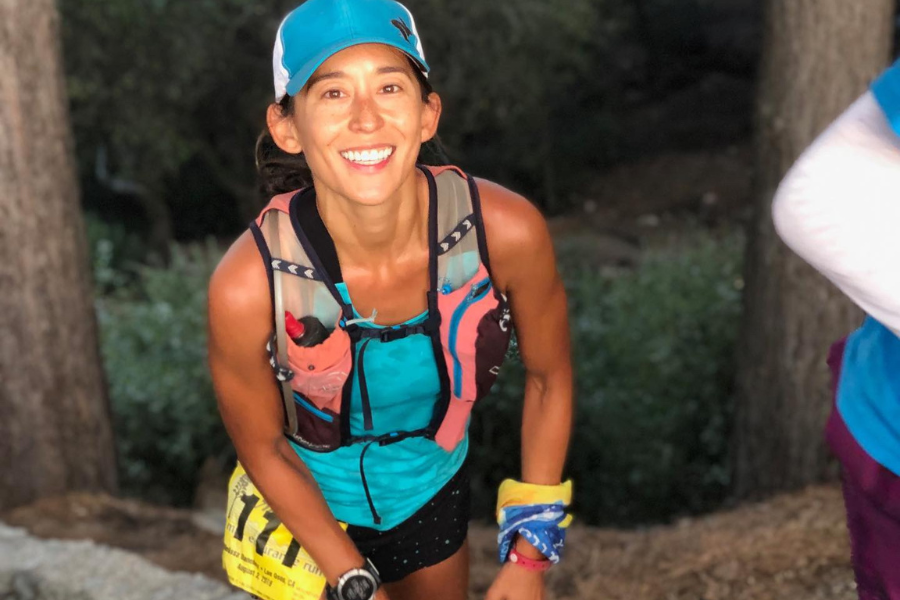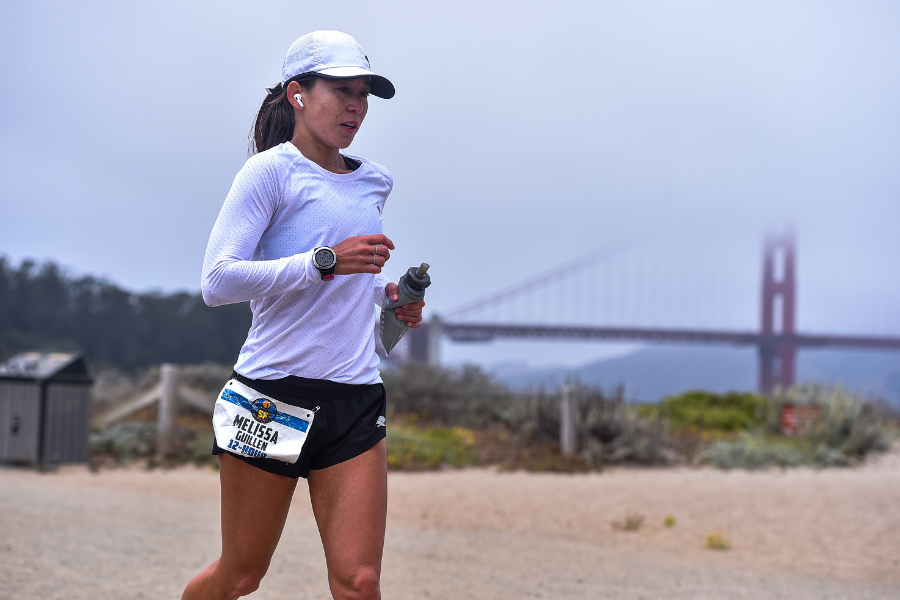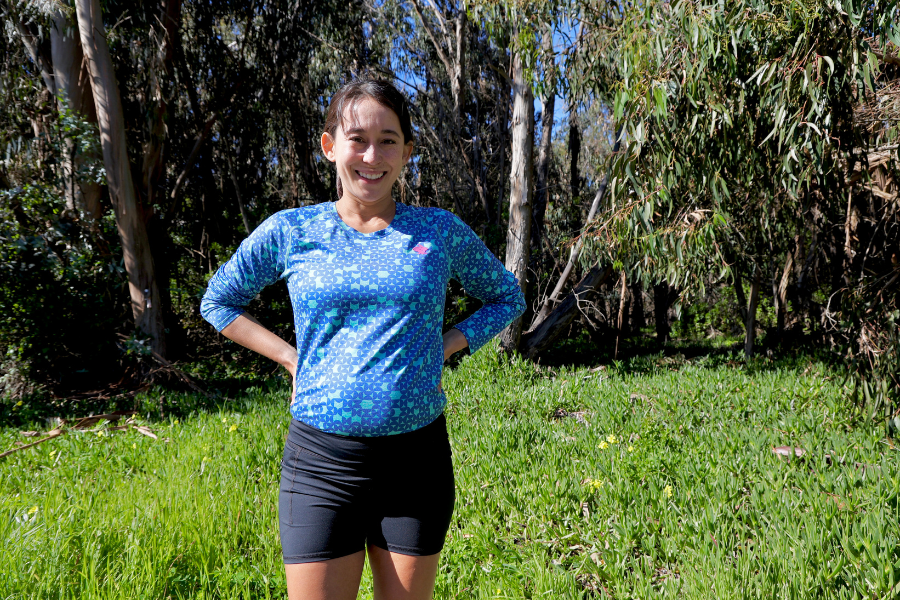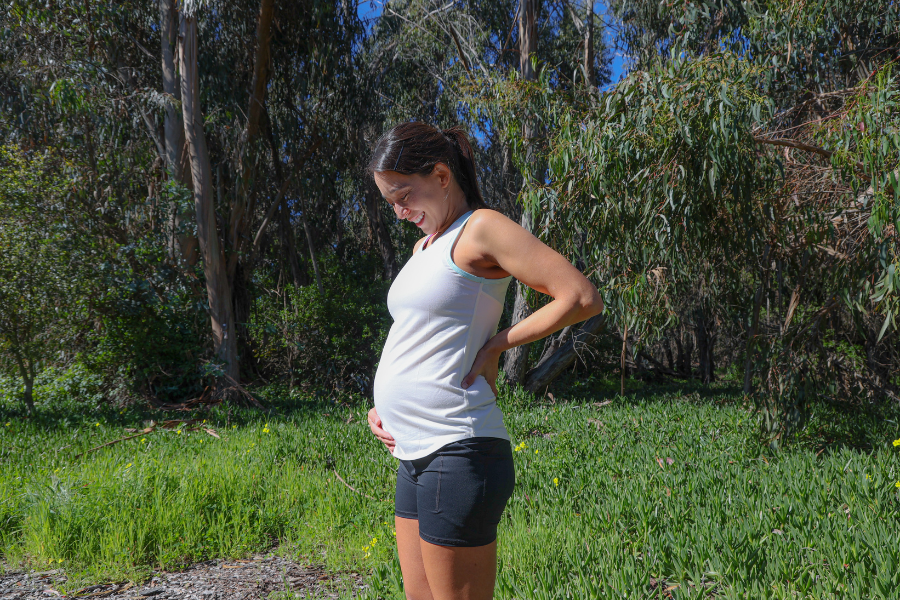When rabbitELITEtrail athlete, Melissa Guillen, first took in foreign exchange students years ago, she didn’t then know the road it would eventually lead her down. Years later, a friend from her running group thought she might be the right fit–given her past experiences with foreign exchange students–to foster a thirteen-year-old, Emily.
Somewhat unexpectedly, Melissa’s role as a foster parent evolved to motherhood when she adopted Emily. Not long after, she was married and became a stepmother to Mackenzie and Noah. Now, she and her husband, Curly, are expecting a biological child in May. We spoke with Melissa about her journey to motherhood, and the lessons she’s learned as a Mother Runner.

Eric: We should start with how you got into running–that’s always fun.
Melissa: Yeah, I definitely took a non-traditional path to running. I never participated in sports. I mostly focused on academics and music. Never did it, never worked out. But there was a point in college when I realized that I needed to change my lifestyle and running happened to be the first thing I tried–just because it seemed easy. There was a running path around a lake near my complex and I started running. And I fell in love. It was little, tiny goals and increasing distances and the next thing I know I was training for my first marathon in the early 2000s. I had a friend, not too many years later, who pressured me into doing a 50k [laughs]. She said, ‘If I can do it, you can do it.’
E: Let’s talk about your journey to motherhood. When did that begin?
M: It began in 2017 through my connection with a local running group, SLO Trail Runners, and I had a great network of people to run with and connect with and everyone ran the local races. Someone I know through the group reached out to me because their daughter was friends with someone who had just gone into foster care at the age of thirteen. I had previously expressed interest in fostering because in the past I had taken in foreign exchange students.
They had a lot of trouble placing this thirteen year old, Emily, because of her age and it’s an underserved system–they don’t have resources. She was getting moved around to different group homes when they reached out to gauge my interest. I thought it was a great idea and she seemed like a great girl. In my head, I thought maybe it would be temporary because the goal is to reunite families. That’s always the goal but as the years passed it didn’t look like it was happening. She was then fifteen or sixteen and we started having conversations about adoption, which we did.

E: That’s wonderful. Have you continued to foster?
M: No, because around that time too–it was 2018–I met my now husband, Curly, and he has two kids. That was another unexpected twist in my life. I had an adopted daughter on my own, and I had two other kids possibly entering my life. I finally relocated to Santa Barbara and there are challenges with blended families with a lot of different things mixing together [laughs]. A lot of change.
E: Based on your race results, it looks like you were able to race fairly often through that period of your life. How were you able to balance motherhood and training and racing?
M: It’s definitely changed how my training looks. Early on in my years running ultras, it was nice to have a little more freedom. I would scout out a trail I wanted to run, go camp there, and be gone half the weekend. Now you don’t really have the ability to do that when you have kids at home. I lost some of that but at the same time you can still merge those lifestyles. We have weekends where we camp with the kids, I’m gone for six hours for a run–you have to balance it. You find time to do it.
E: Did running bring anything different for you as a mother?
M: It’s hard to say because around the same time I became a parent, that’s when I became more serious about my running, too. Things definitely changed, and it took a lot of planning and overlap. There’s times when, maybe, during a therapy appointment for one of the kids, I would run a mile loop around the facility to squeeze in my run. Or splitting up my runs in the morning and evening to fit the miles in. It takes a lot of planning ahead and balancing those things.
E: Your husband, Curly, is a big runner. Do any of your kids run?
M: Yeah, Curly really inspired me to start pushing myself a little bit more. Before then it wasn’t so structured. I really loved when we first started dating, the structure that he had, and he would have workouts and would push himself. I wanted to do the same thing. Thanks to him I’ve had some of my best running years as a result. As far as the kids, none of them are running yet, but they have joined us for runs. Yesterday I went out for a run and my stepdaughter, Mack, joined me on the bike. Or they will start and run a mile with me, and go to our races and cheer us on. We’re not pushing them to do it but the opportunity is always there.

E: You’re now expecting your first biological child. Congratulations! Have you been able to keep running?
M: Yeah, thanks, things have definitely changed [laughs]. I plan to keep running and I’ve continued to run. I even ran the Ventura Half Marathon a week or two ago. I thought I might run two hours and fifteen minutes. Curly wasn’t even ready for me at the finish because I actually finished in under two hours [laughs]. The one thing with pregnancy is that you might feel good one day and awful the next.
What gives me hope are all of the amazing women out there. I live in a community that has so many great runners who have kids and have excelled in the sport after kids, like Jill [Deering]. It gives me hope that I’ll continue when our world changes and we have a little one.
E: You might have more stroller runs than you do now.
M: Oh, definitely. Although, Curly is already claiming all the stroller runs. It surprised me–he’s so ready for it. He’s like, I don’t know if she’ll go on two but I’m going to take her. I’m like, wow, ok! [laughs]
E: It’s good to have those examples out in the world to give you inspiration.
M: It makes it so much easier to wrap your head around. If I didn’t see all those women out there–you get in your head sometimes. You think maybe this is it. Even after my hip surgery, what gave me hope was seeing other people be successful after having the same surgery and their stories. It’s along the same lines–I think that’s why the pregnancy has been easy for me, in terms of staying engaged in the sport. Even with the surgery, I went through it, and it was a rough couple of years to rehab back, but I did it. If I’ve done that once, I have full faith that I can do it again.

E: How has running changed for you during the pregnancy?
M: I just started my third trimester and I’ve definitely noticed that I’ve started to slow down [laughs] and my body will reject running after about thirty minutes. Like, the run I went on yesterday, it felt like when I first started running. Like, this is so hard! [laughs] So, I’m starting to shorten my runs a lot, but it’s been really cool to play with what my body can do day-by-day. I think my peak mileage during pregnancy was like seventy miles in a week. It was cool–I never thought I could. I was going in with pretty low expectations. So, it’s gone well but it’s different now.
E: That’s great. Lastly, through your journey with motherhood and pregnancy–you’ve mentioned other women being an example to you–what would be your message to other mothers out there in balancing running with motherhood?
M: I guess the big thing is that there is a little bit of mom guilt, especially with ultrarunning, which takes so much time. Like, am I being selfish? There’s a little bit of that. At the end of the day, you just have to accept that running, for me, fills my cup. It makes me a better person. I notice after my runs in terms of how I feel, my mood, and how I handle things. It helps me, you know–being great in that helps me be great in other things. There’s so much that it gives to you. You have to look at it that way: I’m being my best self, it’s not being selfish. At the end of the day, you’re an example for your kids. For them to see you work your butt off for a race, and suffer through it. I hope that carries over to the kids that it pays off to work really hard.
E: That’s such a valuable lesson.
M: Yeah, and the failure of it, too, and how you deal with it. I think that’s really important–when races don’t go well. The kids came out to the U.S. Olympic marathon trials in Atlanta where Curly ran. Curly fell early in the race, mile four or five, and hobbled to the finish. He was heartbroken. But I think it was an important moment for the kids to see–to see him be resilient and bounce back from that and learn from it and not let it defeat you. It’s so easy to quit, but for the kids to see him not do that and wake up the next day and start over–I think that’s a really important trait that they see and that sticks with them. It’s not always the best days; it’s not always going to go well.
E: I couldn’t agree more. Thanks for sharing your experiences, Melissa.












